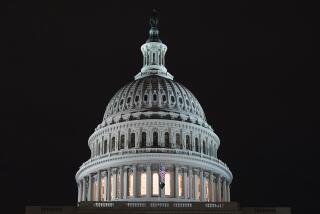Debt-ceiling compromise: Now, it’s time to find the votes
- Share via
Reporting from Washington — Vice President Joe Biden will meet Monday with the Senate and House Democratic caucuses while Republican leaders also huddle to gauge support for the debt-ceiling plan negotiators agreed to Sunday.
The legislative path for the bill was still somewhat unclear as individual members study the details. No votes had been scheduled yet in either the House or Senate on Monday, but could be added once party leadership takes the temperature of their respective caucuses. House Speaker John A. Boehner (R-Ohio) told members Sunday night that the bill would move quickly to the floor, perhaps as early as Monday afternoon.
The proposed deal would raise the debt ceiling to carry the government into 2013, while providing for at least a dollar-per-dollar exchange of spending cuts. The spending cuts would come in two stages. An initial round would impose more than $900 billion in domestic cuts across the federal government over the next 10 years. But the vast majority of those cuts would fall in future years.
A new congressional committee will also be formed with equal membership from both parties, which would recommend by late November $1.5 trillion in further cuts. Unless those recommendations are adopted, $1.2 trillion in additional cuts would automatically be triggered, starting at the beginning of 2013.
The plan could be a tough sell, if early reaction is any indication. Liberal Democrats were incensed at what they saw as a cave-in to Republican demands to slash spending without finding new revenues, as well as the potential for changes to entitlement programs.
Rep. Emanuel Cleaver (D-Mo.), chairman of the Congressional Black Caucus, called it “a sugarcoated Satan sandwich.”
Republicans may also be resistant, particularly in the House. Rep. Bill Huizenga, a freshman Republican from Michigan, said he was reserving judgment until he saw the details. He noted that the deal looked similar to the one that narrowly passed the House on Friday. Huizenga voted for that bill.
“The same people who were telling me I needed to vote no are still telling me I need to vote no,” he said, adding that he was hopeful the new deal could spark a strong campaign to push a balanced budget amendment through Congress.
In his statement on the deal Sunday night, President Obama urged Americans to continue pressuring their representatives to support a compromise.
“Obviously each member is going to have to evaluate this. But we think, at the end of the day, this is an agreement that will pass the Senate and the House and the president will sign into law,” White House senior advisor David Plouffe said on NBC’s “Today” show.
michael.memoli@latimes.com
kathleen.hennessey@latimes.com
More to Read
Get the L.A. Times Politics newsletter
Deeply reported insights into legislation, politics and policy from Sacramento, Washington and beyond. In your inbox twice per week.
You may occasionally receive promotional content from the Los Angeles Times.











